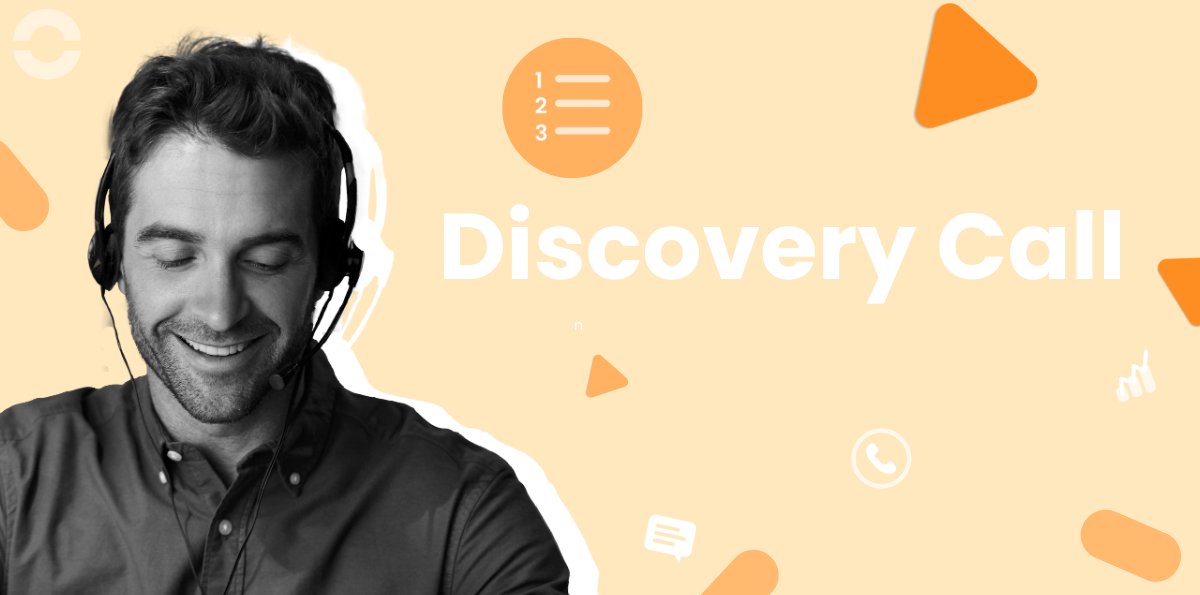Table of Contents
A discovery call is much more than just following a script–it demands listening skills, clarity of intent, and the ability to read between the lines. Knowing how to ask the right questions, at the right time, without being pushy or beating around the bush–that's the real art at play here.
In this guide, we explore what makes a successful discovery call: framing, proven strategies, conversation structure, posture, and more.
Whether you're a freelancer seeking new clients or a member of a structured sales team, there's value here to help refine your approach.
What Is a Discovery Call?
The discovery call often marks the true beginning of a sales relationship. It's a structured, yet flexible exchange between a sales representative and a potential client which usually occurs early in the sales cycle. The goal? To better understand the prospect's context, priorities, constraints, and the logic behind their decision-making.
When handled well, this conversation uncovers valuable insights, sometimes implicit, about the customer needs.
The Objective of the Discovery Call
The goal isn't to persuade at all costs or to mechanically deliver a sales pitch. Instead, it's about assessing whether the product or service truly aligns—or doesn't—with the prospect's expressed or latent needs.
This means carefully exploring the challenges they face, the levers they're considering, and the outcomes they hope to achieve.
Structure of the Discovery Call
Unlike a traditional sales call, which focuses on presenting and selling a product or service, a discovery call is open and exploratory. It's more like a thoughtful inquiry, guided by active listening and a flexible, adaptive approach.
The structure generally includes:
- Introduction
- Exploration
- Rephrasing and validation
- Qualification
However, the true skill lies in adapting the flow based on the prospect's profile, their reactions, and even their silences.
Role in the Sales Process
Discovery calls play a crucial role in the sales cycle. When placed at the right moment, they serve as both a filter and a catalyst.
They help identify prospects who are genuinely aligned with your offer—and save time by gracefully filtering out those for whom the solution won't be a good fit. But the value goes beyond qualification. The discovery call lays the foundation for a trusting relationship, which can later be nurtured through demos, targeted content, or more technical discussions.
Why Are Discovery Calls So Important?
The discovery call is a key milestone—but what exactly makes it so valuable?
Understanding the Prospect's Needs
Discovery calls help you deeply understand your prospects' challenges, goals, and priorities. By asking the right questions—not too vague, not too direct—you're not just fishing for answers, you're creating momentum. At this stage, listening often matters more than convincing.
This level of understanding is essential for tailoring your solution and clearly demonstrating its added value.
Prospect Qualification
Discovery calls allow you to assess whether a prospect is genuinely a good fit. Some leads, while seemingly curious, may lack the budget, decision-making power, or even the right timing. The discovery call is your chance to make that subtle assessment.
It helps you avoid investing resources in weak leads and refocus your efforts on those who show real potential to convert.
Building Trust
Even when discussing strategy or ROI, the interaction remains fundamentally human. The tone and attitude you adopt during the call often set the tone for the future relationship. A prospect who feels listened to is more likely to keep the conversation going. That's also where true differentiation begins.
Laying the Groundwork
A well-executed discovery call lays the foundation for a structured and effective sales process. It's the starting point that fuels key steps like proposal-building, negotiation, and commitment.
It gives you the insights needed to:
- Craft a convincing offer
- Anticipate objections
- Build a tailored, relevant proposal—not just a cold, copy-pasted pitch
Addressing Doubts Early
Objections often come up early—and that's a good thing. During a discovery call, these concerns can be tackled calmly and even neutralized in advance. The goal isn't to resolve everything immediately, but to smooth the path for a potential collaboration.
How to Set the Right Tone for a Discovery Call
To get clear and honest answers, you need to create a conversation-friendly environment. A discovery call should be disciplined yet attentive, otherwise you'll only scratch the surface with polite small talk. Here are some levers you can use to ensure the exchange is both smooth and useful for both parties.
Preparation and Research
Your groundwork begins well before the first word is spoken. Spending just a few minutes exploring your prospect's profile, their company, recent publications, or market trends gives you an edge.
Use LinkedIn, annual reports, press mentions—anything that helps you go beyond the usual “Tell me about yourself.”
Create a Call Script—But Don't Follow It Blindly
Prepare a structured, effective script based on your research. But don't fall into the trap of using a generic questionnaire.
The idea is to have a flexible framework that gives rhythm to the conversation while leaving room for spontaneity.
Open-ended questions, prompts for follow-ups, phrasing that uncovers motivations or hidden objections—all of these should be prepared in advance, but used with tact. The goal isn't to go down a checklist, but to guide the conversation meaningfully.
Respect the Prospect's Time
An effective discovery call shouldn't drag on. Show that you respect the prospect's time by keeping the conversation focused and within a reasonable time frame. While it's not uncommon for these calls to run slightly over 30 minutes, that should remain the exception—not the rule.
Respecting your prospect's schedule is also a sign of professionalism.
Practice Active Listening
Hearing and listening are two very different things. In this context, active listening goes beyond polite silence—it involves asking follow-up questions, rephrasing for clarity, and even slowing down to explore a comment that might otherwise go unnoticed.
This is often when poorly expressed needs become clear, or when a dormant project surfaces through a seemingly minor remark. The key isn't to fill the space, but to truly understand it.
What Questions Should You Ask in a Discovery Call? (With Examples)
Asking the right questions in a discovery call is essential for gathering valuable insights and building trust with your prospect. Below are the main categories of questions you should ask, along with examples to maximize the impact of your conversations:
Questions About the Prospect's Business and Operations
Before jumping into the specifics, it's helpful to understand the context in which your prospect operates. That way, you avoid offering a solution without understanding the environment it must fit into.
Sample questions:
- “How would you describe your company's activity in a few words today?”
- “What projects or challenges has your team been focused on recently?”
- “And you personally—what are you currently being asked to deliver?”
These help you identify the company's structure as well as the key players involved.
Questions About Challenges, Tensions, and Goals
Now it's time to gently approach more sensitive areas—not to push on pain points, but to understand what's slowing progress or causing friction. This is where the real conversation begins.
Helpful examples:
- “What recurring obstacles or frustrations do you run into?”
- “Is there a topic that often comes up in internal meetings but still lacks a real solution?”
- “In your opinion, what's making it hard to implement lasting change right now?”
The more specific the question, the easier it is for the prospect to clarify their expectations—even for themselves.
Questions About Budget and Timeline
Everyone has constraints—whether financial, technical, or time-related. Addressing these topics early may feel tricky, but it helps avoid delays and misunderstandings later on.
Sample questions:
- “Has a budget already been set, or is that still under consideration?”
- “Ideally, when would you like to see concrete results?”
- “Are there internal deadlines or milestones that this project needs to align with?”
Questions About the Decision-Making Process
Even if your contact seems enthusiastic, they may not be the only one involved in the decision. Identifying all stakeholders helps avoid surprises down the line. Ask questions like:
- “How are decisions like this usually made within your organization?”
- “Are there other departments impacted by or involved in this project?”
- “How can I help make the evaluation and implementation process as smooth as possible for you?”
These help you navigate the internal approval process with greater clarity.
Questions to Gauge Expectations and Success Metrics
Finally, it's important to clearly define what your prospect expects from your solution, what success looks like, and what risks they see if nothing changes. This roots your offer in a transformation-oriented mindset.
Useful prompts include:
- “A year after implementation, what would you like to be able to tell your team?”
- “If things remain as they are today, what impact would that have on your business?”
- “What metrics will you use to determine whether this project was a success?”
These questions align your objectives with theirs and bring your solution's added value into focus.
How to Improve Your Discovery Calls
As with any skill, deliberate practice, targeted feedback, and continuous learning are key to improving. Here are a few practical tips you can apply.
Train Your Team Using Data and Collective Intelligence
Before trying to transform outcomes, start by closely analyzing what's already happening in your calls. Listening back to recorded conversations is often enlightening—you'll catch awkward moments, poorly handled objections, and phrasing that really connects.
The downside? It's time-consuming—especially if your reps are handling large call volumes. So how do you manage it effectively?
The best solution is to automate call analysis. AI can help through conversational AI tools like Empower by Ringover, which make it possible to:
- Identify strengths and weaknesses
- Highlight training opportunities
- Continuously improve based on real data
Empower lets you scale your coaching efforts without sacrificing a personalized approach to prospects.
Alongside full call transcriptions, you'll also find automated detection of key moments and conversation topics.
The conversation intelligence software goes even further by identifying areas for improvement, speech patterns, pauses, turn-taking, and more. This deep analysis fuels useful, actionable feedback that can be immediately applied.
But there are also two tools specifically created to support effective sales call training: Pitch Room and AIRO Coach.
Role-play common discovery call scenarios with Pitch Room, which uses AI technology to create adaptive training for every situation. Your team will be able to choose from a variety of personas and skill levels personalized to your business needs. Practicing the sales pitch in a safe and stress-free environment allows agents to refine their approach and benefit from real-time AI feedback. By improving their confidence and sales strategy, reps are perfectly positioned to optimize their conversion rate.
After practicing your approach in Pitch Room, jump into call campaigns with confidence and AIRO Coach. While Pitch Room improves preparations, AIRO Coach accompanies reps during sales calls to provide live feedback and contextual tips. Rather than having to commit a manager or trainer to hours of shadowing to onboard or upskill sales agents, AIRO Coach provides continuous feedback.
Always Define the Next Steps at the End of the Call
As the discovery call comes to a close, it's crucial to clearly define the next steps. This keeps the momentum going and helps maintain the trust you've built. Here's what to do:
Recap the Call: Reinforce Understanding
Before ending the call, take a moment to summarize the key points discussed: a product demo, pain points uncovered, needs identified, and potential solutions outlined. This verbal recap shouldn't sound like a dry report, but rather a shared validation of what's been understood.
It's also a great way to show that you've truly listened–not just heard–and that you're moving forward together in the right direction.
Be Clear–No Vague Follow-Ups
Don't end with a vague “we'll be in touch.” Instead, propose a clear and tailored next step: a product demo, a technical deep-dive, a resource-sharing session, or an internal introduction.
Clarify timelines, stakeholders involved, and get confirmation from your prospect. This is where a well-crafted upfront contract can make a difference:
“Here's what I propose. Let me know if that works for you—or if we should adjust it together.”
This approach adds structure without being pushy and shows that you're taking ownership of the process.
Plan Follow-Up Actions Immediately: Keep the Momentum Going
Set a follow-up timeline immediately after the call. Send any promised documents or information quickly, and schedule the next interaction—whether it's another call or a meeting.
This proactive approach reflects your professionalism and commitment, while keeping the sales process moving forward.
Back Up Your Words with Action
The promise of a follow-up only matters if you deliver promptly. Within hours, send over the materials discussed, suggest a date for the next call, and confirm logistics.
Once again, conversational intelligence tools like Empower can save you valuable time. They automatically generate summaries of the exchange and can even suggest a draft email ready to personalize. It's a simple, efficient way to stay proactive—without sacrificing quality.
Conclusion: The Discovery Call Is More Than a Formality
The discovery call is a strategic moment that shapes everything that follows. Too often handled mechanically, it deserves to be restored to its rightful importance. When well-prepared and skillfully conducted, it becomes a powerful accelerator—of understanding, trust, and engagement.
Looking to build strong business relationships, better qualify your prospects, and tailor your proposals to their real-world challenges? The discovery call is one of the best ways to do that—if handled with rigor.
Ultimately, it helps you make the right decisions—and avoid wasting time… yours and your prospect's.
And if some calls are more difficult than others, the good news is: you can always improve. Thanks to conversational data analysis, leveraging feedback, and tools like Empower by Ringover, you can now industrialize commercial intelligence—without sacrificing nuance.
Want to Go Further?
Ask for a personalized demo, or try Empower now. It's free!
FAQ: Discovery Call
What is a business discovery call?
A business discovery call is a structured exploratory conversation between a prospect and a company representative (usually in sales). Its purpose is to understand the prospect's specific needs, challenges, and goals.
It helps determine whether the proposed product or service can solve the prospect's problems or meet their team's needs.
What are the 3 keys to a successful discovery phase?
To succeed in the discovery phase, focus on these three key elements:
- Understand challenges and goals – Identify the specific problems the prospect faces, as well as short- and long-term objectives.
- Build a relationship of customer trust–Use active listening and genuine engagement to create a positive rapport.
- Propose tailored solutions–Use what you've learned to craft solutions that directly address their needs.
What's the difference between a cold call and a discovery call?
A cold call is typically the first outreach made to a prospect with whom there has been no prior interaction. The goal is to introduce yourself and assess interest.
A discovery call happens after the prospect has shown interest, for example by interacting with your content or attending a webinar. It's more in-depth and aims to thoroughly analyze the prospect's needs and challenges.
What is the main objective of a discovery call?
The primary goal of a discovery call is to gain a deep understanding of the prospect's specific needs, so you can offer a relevant and effective solution. It also lays the groundwork for a trust-based relationship.
Is the SPIN method recommended for discovery calls?
Yes, the SPIN method (Situation, Problem, Implication, Need-Payoff) is highly recommended for discovery calls. It helps sales professionals focus on the prospect's real challenges instead of jumping into product features too quickly.
How does a discovery call help identify the prospect's needs?
The discovery call is the ideal time to deeply explore your prospect's priorities and pain points. By asking open-ended, targeted questions, you create space for the prospect to express themselves clearly.
Combined with active listening and thoughtful analysis, this allows you to spot both obstacles and opportunities—and craft a proposal that's genuinely aligned with their expectations.
Published on September 2, 2025.




